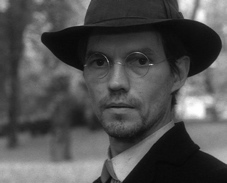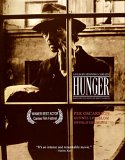| Reviews & Columns |
|
Reviews DVD TV on DVD Blu-ray 4K UHD International DVDs In Theaters Reviews by Studio Video Games Features Collector Series DVDs Easter Egg Database Interviews DVD Talk Radio Feature Articles Columns Anime Talk DVD Savant Horror DVDs The M.O.D. Squad Art House HD Talk Silent DVD
|
DVD Talk Forum |
|
|
| Resources |
|
DVD Price Search Customer Service #'s RCE Info Links |
|
Columns
|
|
|
Hunger
Knut Hamsun's novel Hunger was the height of literary sophistication during the first half of the twentieth century. The Norwegian author won almost universal accolades by writing in a style that expressed the subjective interior state of its main character. This 1966 Scandinavian film was also acclaimed as a brilliant filmic transposition of the 'unfilmable' book; actor Per Oscarsson won a best actor award at the Cannes film festival.
Project X, the company responsible for the DVD restoration of films by Peter Watkins, apparently ran across Hunger while researching film availability in Sweden. The influential feature is forty years old but looks as if it were made yesterday.
Hunger played mostly in film festivals and near college campuses in the late 1960s. Director Henning Carlsen maintains a high level of interest in a story that follows a single unbalanced character through the same icy streets of the Norwegian capital for two hours. The details of Hamsun's book are definitely there: One of the first things we see is a sign advertising 'winding sheets' with which to bind bodies for burial. Per Oscarsson's acting is even more remarkable in that he manages to communicate Knut Hamsen's "inner psychological states" without resorting to extreme acting.
Pontus is perfectly believable as a homeless man too proud to admit that he's in trouble. An artist friend offers to help and Pontus turns him down, pretending that he doesn't need the help. If the clean Norwegian capitol had places for the hungry and cold, Pontus wouldn't go. Unshaven, with messy hair and ratty clothing, he puts on pathetic little acts with shopkeepers and pawnbrokers. Pontus is always on the defensive, indulging fantasies of being a gentleman or inventing lame reasons why he wants to pawn the buttons from his coat.

The story is clearly an expression of the cruel fate awaiting the Artist in the modern world. Pontus has chosen his calling knowing that his talent and intelligence will be resented, and any admission of failure would represent a crushing defeat to his self-image. One landlady suggests sincerely that he return to the country (his accent apparently gives him away) but Pontus cannot imagine doing such a thing. His avenues severely limited, Pontus chooses to quietly starve instead.
The film handles its two main story threads with admirable delicacy. Pontus sees the woman he calls Ylajali on the street and likes her, and expresses his infatuation by following her and even harassing her a bit ("Did you drop a book?"). Much to his chagrin, "Ylajali" turns out to be a bit less than the fine lady he imagines. She just wants a little excitement but Pontus is confused by her conflicting signals -- she's apparently doesn't realize how utterly derelict he is.
When the editor tells Pontus that he's a good writer and that he'll buy his article, the starving man is thrown into a giddy tailspin that does him no good. To conclude the sale, Pontus must return the next day with a revised manuscript, but he cannot concentrate long enough to do the work. The one time he has money for a meal, Pontus cannot keep the food down, and he refuses a free glass of beer. He's gone too far, it's all lost.
By being unable to communicate his dire situation, Pontus makes it impossible for even benevolent people to help him. His editor, his painter friend, and others ask him if he needs money, and he turns them down. Perhaps infuriated that he should be so humbled by money, when he gets any, he gives it away immediately. A grocer accidentally gives the basically honest Pontus 4.5 kroner, and he panics, expressing his confusion by throwing an unnecessary tantrum at the man. By staying true to his desire to be a writer, Pontus has lost the ability to live in society.
Hunger is filmed in beautiful B&W on the cobbled streets of Old Oslo. The Danish, Norwegian and Swedish film mixes talents and languages from all three countries. Per Oscarsson and Gunnel Lindblom (The Virgin Spring, Loving Couples) are Swedish and the director and Birgitte Federspiel (Ordet Babette's Feast) are Danish. Most of the rest of the cast is Norwegian.

Project X's DVD of Hunger is a sterling-quality enhanced B&W transfer in almost perfect condition. Of particular note is the spare but expressive score by Krzysztof Komeda, the noted Polish composer who sadly died not long after completing Roman Polanski's Rosemary's Baby just a couple of years later.
The extras are two lengthy interviews. Director Henning Carlsen talks about putting the project together -- it almost fell apart until he met his perfect Pontus in Per Oscarsson. Regina Hamsun, the beautiful granddaughter of author Knut Hamsun (himself the subject of a fine biographical film recently out on DVD, Hamsun) mostly listens to film historian Paul Auster discuss his personal feelings about the film.
On a scale of Excellent, Good, Fair, and Poor, Hunger rates:
Movie: Excellent
Video: Excellent
Sound: Excellent
Supplements: Interviews with director Henning Carlsen, Regina Hamsun and film historian Paul Auster
Packaging: Keep case
Reviewed: August 24, 2006
Reviews on the Savant main site have additional credits information and are more likely to be updated and annotated with reader input.
|
| Popular Reviews |
| Sponsored Links |
|
|
| Sponsored Links |
|
|
| Release List | Reviews | Shop | Newsletter | Forum | DVD Giveaways | Blu-Ray | Advertise |
|
Copyright 2024 DVDTalk.com All Rights Reserved. Legal Info, Privacy Policy, Terms of Use,
Manage Preferences,
Your Privacy Choices | |||||||












